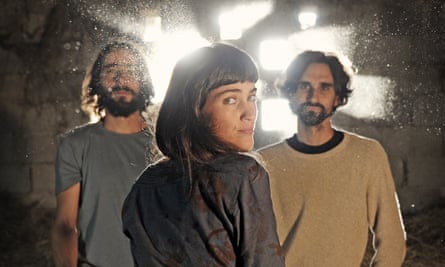What is folk music? Is it music specific to a region and embodying particular cultural traditions, or could there be a more open-ended definition? Perhaps it’s a product of the imagination that can be rooted in traditional modes of expression but also take flight in wonderfully unpredictable ways. Certainly that is where Slovenian trio Širom can be found. They call their music “imaginary folk”, which suggests that in their hands, folk music can travel as far and wide as its creators desire.
The band’s Iztok Koren explains: “It could be traditional music but it’s also experimental. Living folk music is always contemporary – we don’t play museum music. We don’t believe there is only one correct way to play either an instrument or a song. The songs should be alive and that means they will be changing organically.”
This sense of flux extends to the band’s performers and performances. Instrumental roles are fluid within Širom, and when playing live, they swap their array of ancient, traditional, homemade and found instruments on a constant basis. They’ve become a word-of-mouth sensation: to listen to their sublime 2022 album The Liquified Throne of Simplicity, or their equally striking 2019 release A Universe That Roasts Blossoms for a Horse, is to be struck not just by their excellent way with a title but also by the restless volatility of their music. A flurry of different tones and timbres emerges. There are banjos, fiddles and hurdy-gurdies, clattering percussion instruments and tinkling bells, vocal ululations and incantations. Songs range from two minute detours to 20-minute semi-improvisational trance epics. All channels are open. “It’s really important that transitions between parts are fluent and the story is telling itself and it flows like a river with no blockages,” says Koren.
Their approach has roots in a fertile period in the Slovenian music scene. “The idea of the band started in 2014,” says Koren. “We were together on a tour but with different projects. I had a post-rock band. And we discussed starting a folk, acoustic drone band. We started playing together and decided to not stick to this one idea.” Fittingly, the trio improvised together for the first time at a balafon-making workshop.
Širom’s non-traditional approach recalls the post-jazz global fusion experiments of Don Cherry, the ecstatic soundscapes of Sufi trance and even the junkyard innovations of Moondog. They are clearly of a piece with the cross-continental drift towards reclaiming traditional sounds and musical practices from the far-right, which often seeks to locate retrograde ideas in the notion of “tradition”. Koren speaks disapprovingly of the “turbo-folk” scene that originated in Serbia but whose materialistic, often nationalistic values have expanded through other parts of central Europe. Širom’s music feels entirely different: traditional music as liberation, playfulness and exploration. Their connection with rural Slovenia is documented in the delightful film Rural Underground, in which the band take their music out into the hills and valleys of their native country and create a series of fireside, candlelit happenings.
But despite its open-heartedness, their music is a careful combination of instinct and control. “We start by improvising and then we take ideas from the improvisation and work on them,” says Ana Kravanja. “Sometimes we also work on concrete ideas that someone in the group has composed. But sometimes, the idea is choosing a special combination of instruments that would bring some new surprises. It’s a long process of opening the song and closing it again. And then when the song is done, after a few months, it starts changing again.”
For Koren, unlearning standard musical practice is important. Širom’s musical roots are a mixture of learned discipline and self-discovery. “If it feels right and if it’s in reaction to your feelings, it’s OK.” This sense of freedom has roots in the band’s early circumstances. “If you look back 10 or 15 years, there were a lot of DIY clubs,” says Koren. “That was really significant to Širom because all three of us grew up in that environment, organising festivals and shows, often in squats or out in nature. That’s how we got to know each other. There were a lot of projects that came out of healthy competition between places and bands. It was also very supportive. We were very lucky to be part of it. But now it’s really fragmented and not very connected.”
after newsletter promotion
This background paints a picture that is familiar to participants in underground music scenes everywhere, and also shows up the paradox in Širom’s music – its feeling of being both regionally specific but also universal. “When you play songs over and over and play them in different environments and in front of different people,” says Koren, “the music has to be responsive to all those things.”
For all of its sprawl, this is supremely welcoming music. It seems both ancient and modern. These are sounds that belong both around a campfire in 18th-century central Europe and in the back room of a 21st-century arts centre. So maybe that is what Širom really mean by imaginary folk. “When you play jazz or classical music, you know what the form is,” says Kravanja.” But when you play something that doesn’t really have a genre, you just have to let it go. Follow the music.”

